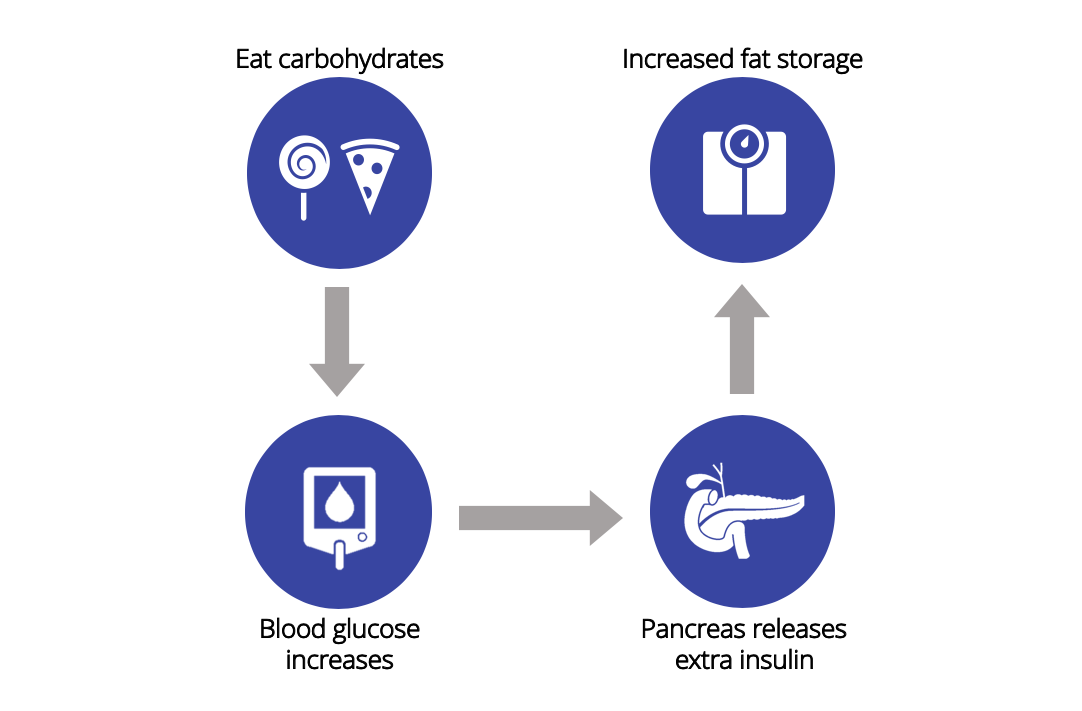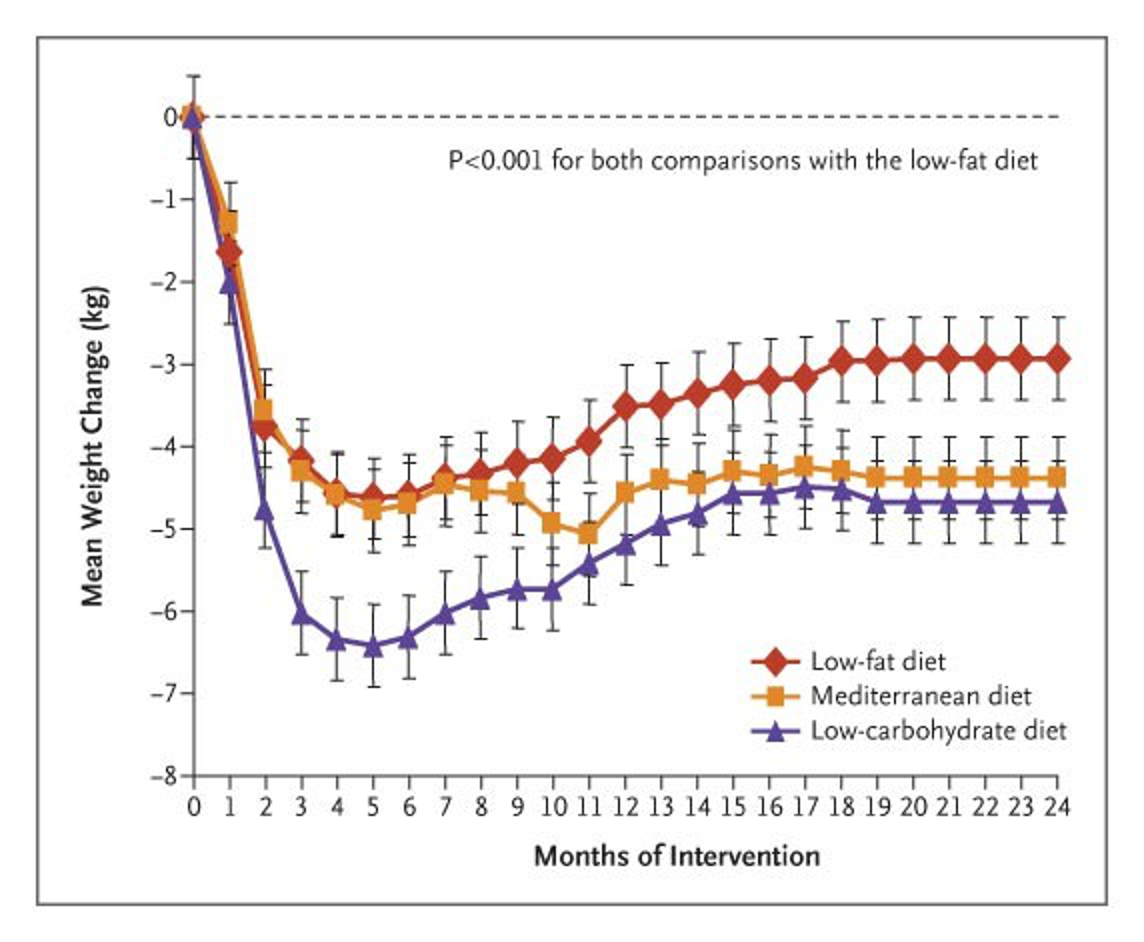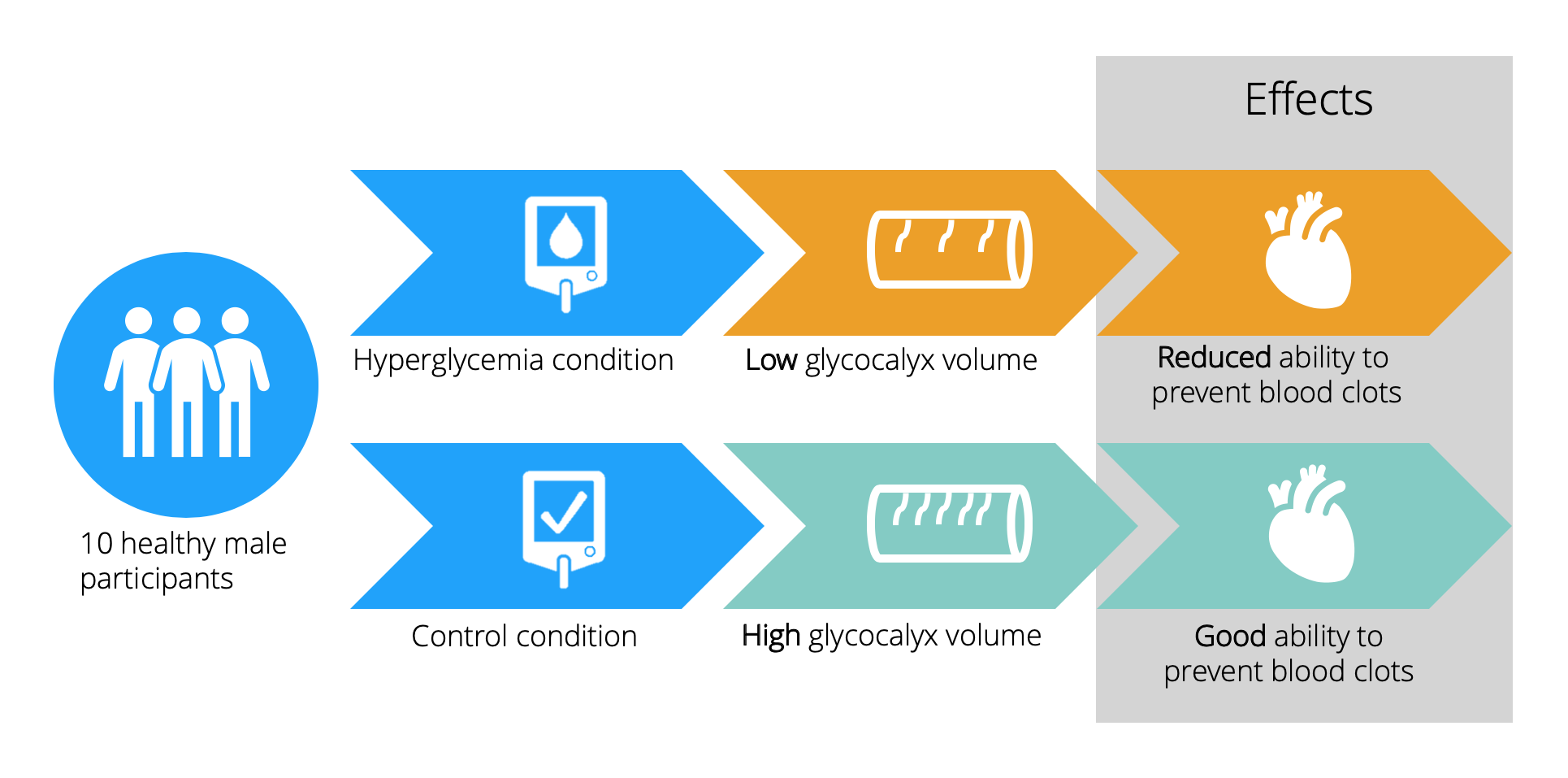Here are the main reasons to try a low-carb diet:
- Lower-carb diets have been shown to have a positive effect on weight loss.
- Many trials have shown that you can lose weight without counting calories while doing lower-carb.
- Lower-carb diets have been shown to be effective at supporting people living with type 2 diabetes.
- The NHS now funds low-carb interventions across the UK to support type 2 diabetes management.
- Lower-carb diets may help to prevent heart disease by protecting the artery wall from excessive exposure to high glucose levels.
Everyone is unique, and there is no magic diet that will suit everyone. As we are constantly bombarded with misleading diet-related information, it can be confusing to know whether to adopt a low-fat, low-carb or ignore it all.
A low-carb diet can have many health benefits, from weight loss to the prevention and management of chronic diseases.
This research-based guide will explain why we believe a lower-carb diet results in the most weight loss and provides the most health benefits while remaining a sustainable way of eating in the long term.
Medication-assisted weight loss with a future focus
Start with Mounjaro, transition to habit-based health with our support

What is low-carb?
There is no official definition of a ‘low’ or ‘lower’ carb diet, which can get confusing.
Research often uses many different classifications, but as a general overview, a lower-carb diet is one where between 20-30% of your overall daily energy intake comes from carbs. This is roughly <130g of carbs (total) per day.
To put this in context, the following examples are one serving of complex carbohydrates and contain roughly 15g of carbohydrate:
- 80g cooked or 1⁄2 uncooked medium potato or sweet potato.
- 1 thin slice of wholemeal or wholegrain bread.
- 1⁄2 wholemeal pitta bread or bread roll.
- 1⁄2 wholemeal wrap.
- 20g uncooked or 50g (roughly 1⁄2 cup) cooked brown rice or wholewheat pasta.
- 20g raw wholegrain cereal, oats, or shredded wheat (approx. 1/3 cup); or 1 wheat biscuit.
When you do eat carbs, you should opt for higher fibre carbohydrates (for example, sweet potato, oats, or wholewheat pasta).
These have a larger molecular structure than carbohydrates with less fibre (for example, white rice, white bread, or white pasta). Fibre makes us feel fuller for longer and has many other health benefits.
If you are following a lower-carb, balanced diet aim to have 1-3 servings of complex carbohydrates per day.
Key points:
- A lower-carb diet is roughly defined as <130g per day of carbohydrate.
- When choosing carb sources, opt for complex carbs, e.g. sweet potato.
Why not eliminate carbs?
Following a lower-carbohydrate diet essentially means decreasing, but not eliminating, our intake of foods containing carbs.
This naturally means we are increasing the amount of protein (e.g meat, fish, or eggs) and fat (e.g. olive oil, avocado, or nuts) in our diet.
It’s important to note that there is a difference between a ‘low/lower carbohydrate’ diet and a ‘ketogenic’ diet.
The ketogenic diet (keto) is high in fat and almost eliminates carbs. By doing this, the body is deprived of its primary fuel source, glucose.
The body then creates new metabolic pathways and functions using fatty acids from fat stores and dietary fat intake.
Over time, ketones which are produced from the breakdown of fat, will start to be used by the brain for energy instead of glucose. This process is called ketosis.
While this may sound ideal, the keto diet can be challenging to follow effectively in the long term. It’s much more restrictive, and one ‘slip up’ will temporarily take you out of ketosis.
Overall, it seems that a lower-carb diet, rather than keto, is the most sustainable for most people to follow in the long run.
Key points:
- Low-carb diets are different from the keto diet (which eliminates carbs)
- In the long term, keto is very difficult for most people to stick to, and the best diet is one that you can keep up.
Prevention or management of type 2 diabetes
There are several convincing theories of how type 2 diabetes develops. Although different theories disagree on whether insulin resistance or weight gain comes first, many include excessive carbohydrate consumption as a factor in developing type 2 diabetes.
Maintaining stable blood glucose levels is essential to prevent complications associated with diabetes.
As carbs have the most significant impact on our blood glucose levels, reducing our intake of carbohydrate-containing foods will reduce the amount of glucose entering the bloodstream in the first place.
This explains why this diet has always been involved in preventing and treating type 2 diabetes.
Recent studies have found consistent benefits in improved blood glucose control, weight loss, and sustained medication reduction when participants followed a low-carb diet.
It’s also been shown that the low-carb diet had a high adherence rate after 12 months, suggesting it’s a more sustainable way of eating in the long run.
Key points:
- Excessive carb consumption is a common factor of the leading theories of type 2 diabetes development.
- A low-carb diet can improve blood glucose control and aid weight loss, which are both important in the prevention and treatment of type 2 diabetes.
Weight loss
The most researched area in the ‘low-carb’ space is weight loss. Since being overweight or obese is a risk factor for type 2 diabetes, it’s essential to consider how effective a low-carb diet is for weight loss.
Low-carb leads to weight loss because protein and fat are more filling than carbs.
Higher protein and fat intake also helps keep our blood glucose (sugar) levels stable throughout the day.
This increase in satiety and reduction in blood glucose fluctuations reduces overall hunger and therefore lowers our overall food intake throughout the day.
Low-carb is also thought to help with weight loss by lowering insulin. Insulin is the hormone responsible for encouraging fat and muscle cells to absorb glucose from the blood, but insulin also promotes fat storage in the body.
When we eat a high-carb diet, the body must release more insulin to take the glucose out of the blood.
So, looking at this process simply: 1) we eat more carbohydrates, 2) these release more glucose into the bloodstream, 3) we need more insulin to get the glucose into the cells, 4) this increased insulin response leads to increased fat storage and weight gain.

Many studies have shown that low-carb diets result in rapid weight loss in the first 6 – 12 months.
Initial weight loss is partly due to water loss, but fat loss also occurs. In terms of maintaining this diet in the long run, research suggests that a low-carb diet is the most effective way to lose weight and keep it off.
A study comparing the weight loss over two years between low-fat, low-carb, and Mediterranean diets demonstrated that all diets produce short-term weight loss, with low-carb producing the most.
At the two-year mark, the low-carb group had maintained weight loss significantly more than the low-fat group.

Key points:
- Low-carb diets may lead to weight loss as protein and fat are more filling, leaving you satisfied for longer.
- Low-carb diets also reduce the amount of insulin in your body, resulting in less fat storage.
Lowering the risk of heart disease
It was previously thought that increasing fat in the diet (as naturally happens when following a low-carb diet) might negatively impact our cholesterol levels and increase the risk of cardiovascular disease (CVD).
Research studies have shown that fat intake in the diet can affect cholesterol levels.
However, large meta-analyses have found no relationship between saturated fat intake and CVD or mortality rates.
This suggests that lowering carb intake and replacing it with increased protein and fat will not increase the risk of CVD as previously thought.
To further support this, a recent Prospective Urban Rural Epidemiology (PURE) study, involving over 135,000 participants worldwide also found that populations with higher fat intake had reduced mortality rates.
It’s essential to remember that this was an observational study, so we cannot draw causal conclusions from it. However, this study makes the belief that increased fat intake leads to increased mortality much less likely.
One theory why low-carb diets reduce cardiovascular disease risk is that they help protect the lining of the blood vessels.
A slippery, slimy layer inside our blood vessels looks like a billion tiny hairs under a powerful microscope called the Glycocalyx.
The function of this layer is mainly to protect the underlying blood vessel from damage and to prevent blood clotting.
Research, published by the American Diabetes Association, suggests that high blood sugar (as a result of high carbohydrate intake) significantly reduces this protective layer resulting in damage to the lining of the blood vessel.

Key points:
- Contrary to previous beliefs, lowering carb intake and increasing protein and fat intake does not increase your risk of heart disease.
- A suggested theory of why low-carb diets protect against heart disease is that they help to protect our blood vessels.
Tips on how to eat lower-carb
Making simple swaps for the carbohydrate element of your meal to low-carb foods is an excellent way to keep enjoying the food you love while still reducing the carb content. Here are some of our favourite swaps:
- Swap rice for cauliflower rice
- Swap spaghetti for courgetti (spiralised courgette)
- Swap mashed potato for cauliflower mash
- Swap noodles for zoodles (spiralised courgette)
- Swap potato chips for celeriac chips
- Swap tortilla wraps for lettuce cups
- Swap roast potatoes for roast carrots
- Swap potato crisps for kale crisps
For more tips and specific meal plan ideas, look at our guide on low-carb recipes.
Key point:
- Eating lower-carb does not mean sacrificing the food you love, just make simple swaps for the carb element of the meal.
Take home message
- There are many compelling reasons to adopt a low-carb diet.
- All of the leading theories of the development of type 2 diabetes include excessive carb intake.
- The best diet for weight loss is one you can stick to long-term, so a lower-carb diet is a good option for many people rather than a keto diet.
- Evidence suggests that lower-carb diets are the most effective for short- and long-term weight loss.
- Research shows that a low-carb diet’s natural increase in protein and fat does not increase your risk of heart disease but reduces your risk.


